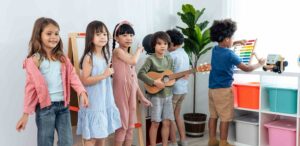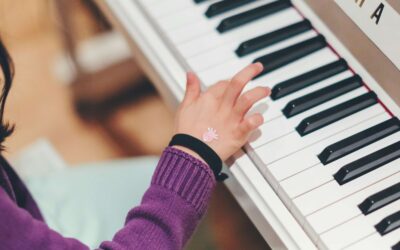The value of music education is often underestimated. However, learning to play an instrument offers children far more than just the ability to make music; it equips them with essential lifelong skills that positively impact their personal and academic lives. Through structured music lessons, children gain invaluable qualities such as discipline, patience, and confidence. These skills not only aid in their musical journey but also prepare them for various challenges they will encounter throughout their lives. In this post, we will explore why every child should learn an instrument and how music education plays a vital role in their overall development.

Discipline: Building Strong Habits Through Music Education
One of the most significant skills children develop through music education is discipline. Learning an instrument requires a commitment to regular practice and a dedication to improvement. Music lessons instil the importance of setting aside time for practice, teaching children how to create routines and stick to them. This commitment fosters a sense of responsibility, as they learn that progress comes from consistent effort rather than immediate results.
Moreover, the journey of learning an instrument involves overcoming various challenges. Whether it’s tackling difficult pieces or perfecting new techniques, children quickly learn that perseverance is key to success. This discipline translates beyond music lessons, as students often find that the skills they develop in their musical pursuits positively influence their academic performance. The focus and concentration required in music education can enhance their ability to tackle subjects in school, demonstrating that the benefits of learning an instrument extend far beyond the music classroom.
Patience: The Value of Progress Over Time In Music Lessons
Learning to play an instrument is a journey that teaches children the importance of patience. Unlike many instant gratification experiences available today, music education emphasises that real progress comes gradually. During music lessons, students often find themselves facing challenging pieces that require time and consistent effort to master. This process helps them understand that improvement is incremental, as they develop skills over weeks and months rather than overnight.
As children work through these challenges, they learn to appreciate the hard work that goes into mastering a piece of music. They become adept at setting realistic goals and celebrating small victories along the way. This cultivation of patience also helps them develop a mindset that values long-term success over short-term results, a lesson that is invaluable in both academic pursuits and personal endeavours. Ultimately, the ability to remain patient while striving for improvement prepares children for future challenges, instilling resilience that will serve them well throughout their lives.

Confidence: Overcoming Challenges and Performing
Another critical benefit of music education is the boost in self-confidence that comes from learning to play an instrument. Music lessons provide children with opportunities to overcome challenges, leading to a sense of achievement as they master new skills. This newfound confidence often manifests as students tackle increasingly complex pieces and refine their technique, reinforcing their belief in their capabilities.
Public performance is a significant aspect of music education, whether in school recitals or group performances with peers. When children showcase their skills, they not only celebrate their hard work but also face their fears, such as stage fright. Successfully performing in front of an audience, whether solo or as part of a band, teaches them to manage anxiety and builds their public speaking skills. The confidence gained through these experiences extends beyond music, empowering children to approach various situations with greater assurance. By providing a supportive environment for performance, music education fosters a lifelong belief in their ability to succeed, both on and off the stage.
Other Lifelong Skills:
Teamwork
In addition to discipline, patience, and confidence, music education fosters a variety of other lifelong skills that benefit children in numerous aspects of their lives. One key area is teamwork. Through group music lessons and ensemble experiences, students learn to collaborate effectively with their peers. Playing in a band or choir requires communication and cooperation, teaching children how to listen to others and blend their contributions to create a harmonious outcome. These experiences promote social skills and the ability to work well with diverse groups, both essential in today’s collaborative environments.
Creativity, and Emotional Expression
Creativity is another invaluable skill nurtured through music education. Learning to play an instrument encourages children to express themselves artistically, enhancing their creative thinking and problem-solving abilities. Whether they are improvising during a jam session or composing their own pieces, music lessons inspire innovation and original thought.
Moreover, music serves as a powerful outlet for emotional expression. As children navigate their feelings, music education provides a healthy way for them to process and communicate emotions. This emotional connection to music can foster empathy and understanding, helping children develop deeper relationships with themselves and others.

In conclusion, the benefits of learning an instrument through music education extend far beyond the joy of making music. The skills children acquire—discipline, patience, confidence, teamwork, creativity, and emotional expression—play a crucial role in their personal and academic development. By investing in music lessons, we empower children to face life’s challenges with resilience and assurance.
Every child deserves the opportunity to explore the world of music and experience these transformative benefits. Programs like Ready Set Rock offer comprehensive music education that nurtures not only musical talent but also essential life skills. Encouraging children to learn an instrument from a young age is an investment in their future, equipping them with the tools they need to thrive in all areas of life. Let’s embrace the power of music and give our children the gift of lifelong skills through music education.




0 Comments